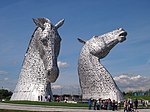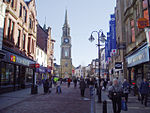Falkirk ( Scottish Gaelic: An Eaglais Bhreac, Scots: Fawkirk [ˈfɔːkɪrk]) is a town in the Central Lowlands of Scotland, historically within the county of Stirlingshire. It lies in the Forth Valley, 23+1⁄2 miles (38 kilometres) northwest of Edinburgh and 20+1⁄2 miles (33 km) northeast of Glasgow.
Falkirk had a resident population of 32,422 at the 2001 UK Census. The population of the town had risen to 34,570 according to a 2008 estimate, making it the 20th most populous settlement in Scotland. Falkirk is the main town and administrative centre of the Falkirk council area, which has an overall population of 156,800 and inholds the nearby towns of Grangemouth, Bo'ness, Denny, Camelon, Larbert and Stenhousemuir, and the cluster of Braes villages.
The town is at the junction of the Forth and Clyde and Union Canals, a location which proved key to its growth as a centre of heavy industry during the Industrial Revolution. In the eighteenth and nineteenth centuries, Falkirk was at the centre of the iron and steel industry, underpinned by the Carron Company in nearby Carron. The company made very many different items, from flat irons to kitchen ranges to fireplaces to benches to railings and many other items, but also carronades for the Royal Navy and, later, manufactured pillar boxes and phone boxes. Within the last fifty years, heavy industry has waned, and the economy relies increasingly on retail and tourism. Despite this, Falkirk remains the home of many international companies like Alexander Dennis, the largest bus production company in the United Kingdom.
Falkirk has a long association with the publishing industry. The company now known as Johnston Press was established in the town in 1846. The company, now based in Edinburgh, produces the Falkirk Herald, the largest selling weekly newspaper in Scotland.
Attractions in and around Falkirk include the Falkirk Wheel, The Helix, The Kelpies, Callendar House and Park and remnants of the Antonine Wall. In a 2011 poll conducted by STV, it was voted as Scotland's most beautiful town.










